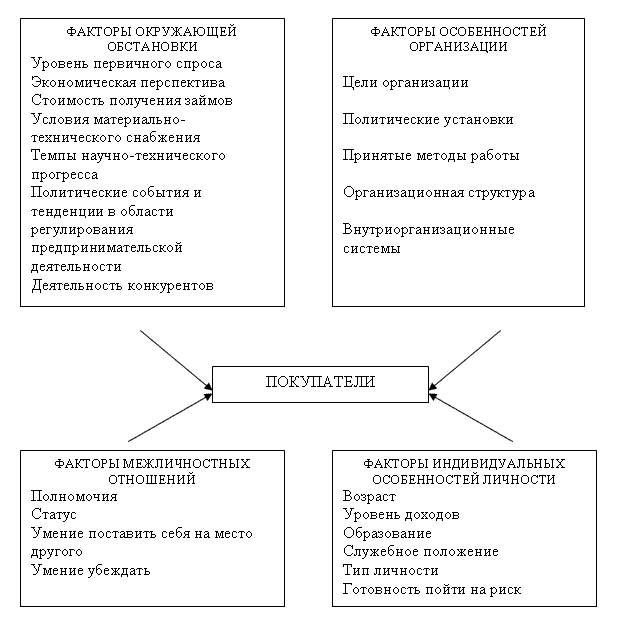home
 Marketing Marketing
 Basics of Marketing - Kotler Philip Basics of Marketing - Kotler Philip
|
Basics of Marketing - Kotler Philip
What has a major impact on buyers of industrial goods?
In the decision-making process, the buyer of industrial goods is subject to a variety of influences . Some market leaders believe that the main influence is the economic order. In their opinion, buyers favor a supplier who asks for a minimum price or offers the best product or the most comprehensive service. According to this point of view, sellers of industrial goods should concentrate efforts on offering buyers obvious economic benefits.
According to other sellers, procurement agents are lively in response to personal motives, seeking assistance, attention or opportunities to reduce risk. Here are the findings of a study of the behavior of procurement agents of 10 large firms.
Even after entering the office, the manager remains a man. He responds to the "image", makes purchases from companies that he considers "close", favors suppliers who show respect for him and are considered with his personal views; To suppliers who do something beyond the usual "just for him." The manager "reacts extremely" to actual or apparent disrespect and is inclined to refuse the services of companies that do not respond to requests for proposals or delay these responses.
According to this point of view, sellers of industrial goods should mainly focus on the human and social factors of the situation of the purchase.
Procurement agents usually react to both economic factors and personal factors. Given the considerable similarity of suppliers' proposals, supplyers do not have sufficient grounds for rational choice. Since the satisfaction of the organization's goals can be achieved with the help of any supplier, personal factors can come into play. On the other hand, if competing goods are significantly different from one another, procurement agents are more responsible for their choice and pay more attention to economic factors.
Various circumstances that affect procurement agents, such as environmental factors, organizational characteristics, interpersonal relationships and individual personality characteristics, are listed in Fig. 41 and are described below.
FACTORS OF THE ENVIRONMENT. Buyers of industrial goods are strongly influenced by such factors of the current and expected economic situation, the level of primary demand, the economic outlook and the cost of obtaining loans. As the level of economic uncertainty increases, buyers of industrial goods stop making investments in the purchase of machinery and equipment and seek to reduce cash inventories. An increasing factor is the environmental factor, such as the imminent shortage of basic raw materials. Firms are increasingly willing to buy and maintain large stocks of scarce materials. Affect buyers of industrial goods and such environmental factors as the pace of scientific and technological progress, political events and the activities of competitors. The seller of industrial goods should also closely monitor all these factors, determine the nature of their influence on the buyer and seek to turn emerging problems into new opportunities.
FACTORS OF THE PECULIARITIES OF THE ORGANIZATION . Any purchasing organization has its own goals, political attitudes, its own methods of work, its organizational structure and its intra-organizational systems, which the seller of industrial goods must study. In this connection, a number of questions arise. How many people participate in purchasing decisions? Who are these persons? What are the evaluation criteria they are guided by? What are the company's policy orientations regarding the activities of its procurement agents and what restrictions does it have on this activity?

Fig. 41. The main factors affecting the behavior of buyers of industrial goods
FACTORS OF INTER-RELATIONSHIP RELATIONS . The purchasing center usually includes several people of different status, with different powers, different skills to put themselves in the place of another, different skills to convince. Vendors of industrial goods are unlikely to learn about the dynamics of their group behavior in the procurement decision process, although any information that can be obtained about the members of the purchasing center and the interpersonal relations of these people will be useful.
FACTORS OF INDIVIDUAL PECULIARITIES OF THE PERSON . Each participant in the decision on procurement brings to the process their personal motivations, perceptions and preferences. All this depends on the age of the individual, the level of his income, education, position, type of his personality and willingness to take risks. The procurement agents adhere to clearly different approaches to the organization of their work. Some of the young highly educated suppliers are "crazy" on computers and before choosing a supplier conduct scrupulous machine analysis of all competitive bids. Others - the "iron guys" of the old school - are achieving their goal by pushing suppliers together. Vendors of industrial goods must know their customers and adapt their tactics to specific factors of the environment, organizational characteristics, interpersonal relations and individual personality characteristics that affect the purchase.


Comments
When commenting on, remember that the content and tone of your message can hurt the feelings of real people, show respect and tolerance to your interlocutors even if you do not share their opinion, your behavior in the conditions of freedom of expression and anonymity provided by the Internet, changes Not only virtual, but also the real world. All comments are hidden from the index, spam is controlled.